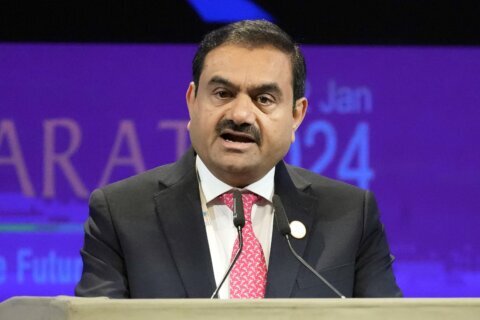Most entrepreneurs at one time thought that creating a successful business would be the most difficult task in the world. But once they created that business, they realized that maintaining, preserving and growing a successful business can be an even taller order.
It’s the same with money. Becoming wealthy is hard, but maintaining, preserving and growing that wealth can even be harder.
[Sign up for stock news with our Invested newsletter.]
Consequently, the kind of financial advisor that high-net-worth individuals (HNWIs) require often has a very complex set of capabilities, and not many financial advisors can handle that level of complexity.
Let’s consider what makes financial planning for HNWIs unique, what you should look for in a financial advisor and how to select one:
— What makes financial planning for HNWIs unique?
— What HNWIs should look for in a financial advisor.
— How to find financial advisors with a high-net-worth focus.
[How to Invest During Rate Cuts]
What Makes Financial Planning for HNWIs Unique?
Importance of Risk Management
As a high-net-worth investor, you must protect your assets from various risks including financial crises, economic recessions, market volatility, “acts of God,” lawsuits and other issues. The wealthier you become, the more attuned you are to various types of risks and the financial consequences of these risk factors.
Therefore, you are not just looking for a financial advisor who can make you money, you need someone who can also help preserve the wealth you’ve already accumulated. This is because the wealthier you are, the more you are concerned about managing and preserving your wealth.
“We find that the vast majority of new clients initially come to us most anxious about the risks associated with the long-term sustainability of their wealth,” says Adam Carlin, private wealth advisor at Morgan Stanley Private Wealth Management in Coral Gables, Florida. “This is quite often measured in the number of future generations of descendants and/or charitable causes which could ultimately benefit from the wealth they’ve created.”
Estate Planning and Thinking Generationally
HNWIs also tend to think generationally, or about how they can preserve wealth for future generations.
As a high-net-worth investor, this implies that estate planning is a big deal for you. You don’t just want to pass on wealth to future generations, you want to do so in the most cost-effective way (minimizing tax liabilities).
Similarly, you are concerned about preserving your legacy, maintaining the unity of the family after your death, and also giving back to society in the form of charity.
Consequently, you are not just looking for a good investment management team; rather, you need a financial advisor who can also think generationally.
Tax Planning Is a Priority
The more of your money you can keep for yourself, the better. Therefore, you are also concerned about minimizing your tax liabilities. Every investment strategy you choose must pay attention to tax implications.
Since tax laws change, you also want to quickly understand the implications of current and proposed changes and act accordingly.
To that end, you need a financial advisor who understands the tax codes, keeps track of relevant changes and can design your investment strategies in a way that minimizes your tax liabilities.
[READ: 10 Things Your Financial Advisor Should Not Tell You]
What HNWIs Should Look for in a Financial Advisor
Based on what we have covered, the following are crucial:
Wide Range of Competencies
You don’t want an advisor who is only good at maximizing returns from a portfolio. You want a team of experts that can also reduce risk, minimize tax liabilities and think with a long-term perspective.
In essence, you want a financial advisor who is excellent at risk management, estate planning, tax planning and retirement planning, among other capabilities.
Ability to Deal With Complex Portfolios
The portfolio that will meet your special needs will often involve complex strategies like risk hedging, tax-loss harvesting and investing in alternative investments (hedge funds, private equity firms, commodities, cryptocurrencies, etc.).
Personalized Offerings
The importance of personalization in financial advice cannot be overemphasized. Financial situations differ, and even best practices need to be applied in different ways to different people.
This is especially true for HNWIs. Wealthy people are not all alike, and their priorities vary. Thus, you will need a financial advisor who can treat you as a unique person and offer financial advice and strategies to achieve your unique goals given your future goals and current financial situation.
Experience and Expertise
Regarding experience, your focus should be on financial advisors with a good track record of working with HNWIs. An advisor with five years of experience working with HNWIs is preferable to an advisor with 10 years of experience who hasn’t worked with one.
This implies that the quality of experience should be prioritized over the number of years.
“Make sure that an advisor has plenty of experience working with clients in similar situations and is trustworthy and personable,” says Karen Harding, a partner in the private wealth practice group at NEPC in Portland, Oregon.
Regarding expertise, focus on whether the financial advisor has the kind of team that can offer the wide range of competencies you are looking for. Do they have expert risk managers and tax accountants, or are they all research analysts who only know how to select good stocks?
Fee-Only Advisors
You want a financial advisor who has a fiduciary relationship with their clients. That is, they are required by law to act in the best interests of their clients.
Some financial advisors will sell you certain products because they earn commissions on them and not because they are the best. This is why you are better off with a fee-only advisor who will not receive commissions on any product recommendation.
Collaboration With Other Professionals
Since your financial life is integrated into other aspects of your life, your financial advisor should have the collaborative skills to work with other experts. For example, during your estate planning, they will need to work with your estate planning attorney.
In essence, your financial advisor must have the interpersonal skills required to work with other experts to deliver the best results for you.
How to Find Financial Advisors With a High-Net-Worth Focus
Ask Your Current Financial Service Providers
The commercial bank(s) you currently use may have a wealth management and private banking subsidiary. If you are satisfied with their current service delivery, you may also find their other services useful.
Ask Other High-Net-Worth Individuals
Word-of-mouth recommendations from people you trust may be an even better option. However, focus on family and friends who are in similar financial situations (they are also HNWIs) and prioritize those who have direct experience (they have worked with the financial advisor they are recommending).
Create an Initial List
Make a list of all the recommendations you get and also include the wealth management arm of the commercial bank you are using, if they have one.
If you think the list is not long enough, you can find a list of qualified financial planners through the following aggregators:
— Certified Financial Planner Board of Standards (CFP Board)
— Financial Planning Association (FPA)
— National Association of Personal Financial Advisors (NAPFA)
— National Association of Estate Planners and Councils (NAEPC)
Prune Down the List
Now is the time to evaluate the financial advisors on your list based on the factors we have considered in the previous section — a wide range of competencies, dealing with complex portfolios, personalized offerings, experience and expertise, fee-only model, and collaborative skills.
If you apply these criteria dutifully, you should have a narrow list.
Interview the Advisors on the List
Choosing between the remaining alternatives will require an interview with one of their representatives.
“The biggest advice would be to interview multiple firms and advisors to see which one fits you the best,” says Jen Reid, financial planner and founder of Base Financial Planning in Boston. “You will learn a lot in the interview process.”
Ask relevant questions about experience, expertise, fee structures, core competencies and the level of personalization, among others.
Select an Advisor
After the interviews, you should be in a better position to choose the right financial advisor. The most important thing in the process of finding a HNWI financial advisor is clarity about your goals and needs.
Therefore, before you start making lists and interviewing advisors, be sure about your goals and the type of financial advisor that can help you achieve them.
More from U.S. News
How to Invest During Rate Cuts
Is Investing in Renewable Energy a Good Idea? Here’s What Our Experts Say
7 Best Investments During a Recession
How to Find a High-Net-Worth Financial Advisor originally appeared on usnews.com
Update 09/19/24: This story was previously published at an earlier date and has been updated with new information.







